|
MUSIC
|
| |
|
| Constantly updated: last updated
09/02/2002 |
| |
|
| We here at HARO have been told that we have a bizarre taste
in music.
So what's currently in HARO's jukebox?
|
| |
|
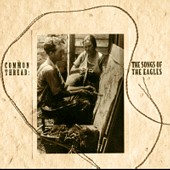 |
Common Thread: The Songs of the Eagles, Various
(1993). Everybody who was elated by the recent Eagles reunion has Common
Thread to thank. Eagles member and conservationist Don Henley conceived
this album of Eagles covers by country artists as a benefit to save Walden
Pond from ruin. Henley and Glenn Frey came together to participate in a
video for Travis Tritt's take on Take It Easy, which later paved
the way for the reunion album Hell Freezes Over. As a whole, Common
Thread is a good album not because of the covers, but because of the
source material. As with many cover albums, the artists do not really do
anything original with the songs, they just remake them. In this instance,
most of the remakes have an extra twang to them. After all, how hard is
it to 'countrify' something that is already almost country? Most of the
songs chosen are fairly obvious choices also; no artist was willing to take
a chance with some of the Eagles' later, harder material. Instead there
are fairly boring renditions of Already Gone by Tanya Tucker, Desperado
by Clint Black and Peaceful Easy Feeling by Little Texas. John Anderson,
Suzy Bogguss, and Diamond Rio fare better on Heartache Tonight, Take
It To The Limit, and Lyin' Eyes respectively. Other contributing
artists include Brooks & Dunn, Lorrie Morgan, Billy Dean, Trisha Yearwood
(who gives the album's best performance on New Kid In Town), Vince
Gill, and Alan Jackson. Basically, the Eagles have an extensive catalogue
of good songs, and it is nice hearing them done differently, though not
by much. |
| |
|
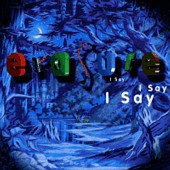 |
I Say I Say I Say, Erasure (1994).
Aside from the hit Always, I Say I Say I Say marked a decline
in the popularity of new Erasure material. Has anybody (not a diehard fan)
heard from them since? By the way, they released a new album in Europe,
and it should arrive here sometime next year. This album is remarkable not
for any sort of innovation or deviation, but for how similar it is to everything
else Erasure does; almost bland. Erasure (consisting of Andy Clarke and
Vince Bell) are wonderful at crafting pure pop confection, with the continuous
themes of love and loss. They have a very distinct sound of all synthesizers
and an amazingly high male voice, and everything here sounds nice, but that's
not always enough. The songs also alternate between danceable numbers and
love ballads, and although lines like "The spirit will fly and return
with a new found energy/So keep it/Within and delight/As your garden grows"
from Man in the Moon and "Walked into the ring of fire/Heart
in a wall of flames/Put my blues away" from Blues Away sound
incredibly sappy when read, but oddly feel right in place when accompanied
by the music. It's not the best Erasure, but it still is Erasure, and there's
nothing quite like it. |
| |
|
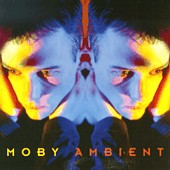 |
Ambient, Moby (1993). Nearly a
decade before the world-at-large discovered Moby with the release of Play,
he was busily shaping the world of techno. During this period, Moby was
a pioneer of techno, lending his face to a mainly anonymous genre and signing
to major labels. The latter acts caused some to call him a 'sell-out.' Ambient
(released well before the term was coined) is a collection of previously
unreleased songs from the late 1980s and early 1990s. This is a vastly different
Moby than what most people are used to; not the usual beat-driven dance
music, but a slower, subdued, and less insistent. The beats are still there,
but they are wrapped amidst lush, evocative melodies, like in Tongues.
His classical training (and hints of later works like the album I Like
to Score or God Moving Over the Face of the Waters from the movie
Heat) show in the piano driven J Breas and Piano &
String. However, these works, and everything else on the album, uses
everything sparingly. There are no vocals on the album at all, the only
thing that comes close is some chanting on Lean on Me, the final
track. Still, this does not feel like somebody shifting their style to match
another, it is more a crafted musician experimenting with other styles.
The result is different, but still his. |
| |
|
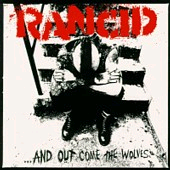 |
...And Out Come the Wolves Rancid
(1995). Berkely based Rancid, consisting of Tim Armstrong (vocals and guitar),
Brett Reed (drums), Lars Frederiksen (guitar), and Matt Freeman (bass) reached
its zenith with this release. They have released two more albums in the
meantime, but have not reached the same commercial or critical acclaim.
Radio hits Time Bomb and Ruby Soho were the main contributors
the commercial success. Frequently considered the sonic and lyrical successors
of The Clash, Rancid embodies an 'old school' punk mentality with their
sky-high mohawks, tattoos, leather studded jackets, and short, furious songs,
mixed in with generous helpings of ska (yes people, ska does not necessarily
mean horns). The Armstrong's gravel-like vocals are sometimes barely understandable
and help contribute to the distinctiveness of Rancid over the 19 songs here
(and the album is still relatively short). Time Bomb and Ruby
Soho were so successful because they were loud, catchy, and hook-laden.
Along with other standouts like Olympia, WA. and Roots Radicals,
Rancid follows the "write what you know" ethic, telling gritty
stories of the streets and the people they know on them, like on Junkyman,
Daly City Train, and As Wicked. |
| |
|
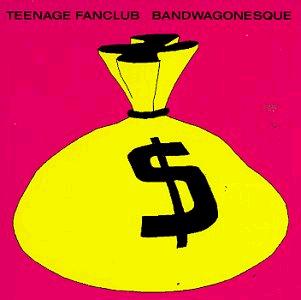 |
Bandwagonesque Teenage Fanclub (1991).
Teenage Fanclub is one of the best band nobody's ever heard of, and Bandwagonesque
is one of their best albums. Although the general public ignored them, 'real'
alternative stations (i.e. college radio) and the critics recognized this,
and Spin magazine named it best album of 1991, over such heavyweights as
Nirvana (Nevermind) and REM (Out of Time). This album is a
wonderful pop-guitar rock confection, with chiming guitars, wry lyrics,
and pretty vocal harmonies, and represents for the band an artistic peak
and a commercial breakthrough that never really emerged. The Scottish band
consists of Norman Blake, Gerard Love, and Brendan O'Hare (now gone), and
all three share writing credits. It easy to tell from listening to Bandwagonesque
that the three are having fun with their music and their lyrics. Songs can
be deceptively simple like What You Do To Me (which essentially has
2 lines) or tongue-in-cheek like Metal Baby. They tackle rock star
worship in The Concept and craft some nifty guitar rock in album
closer Is This Music? |




